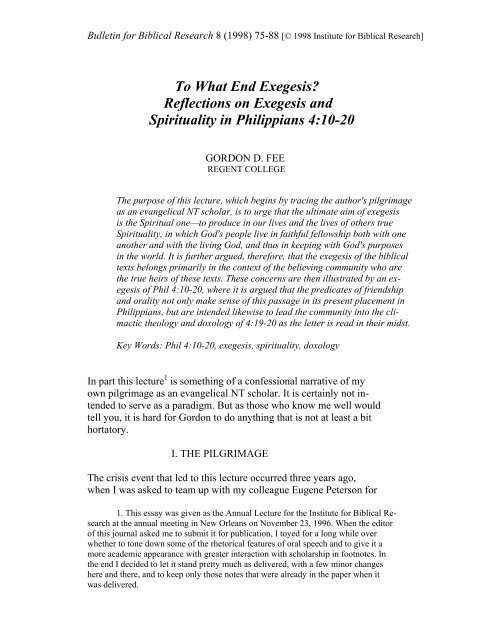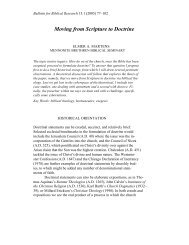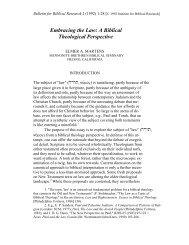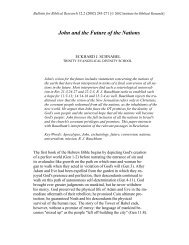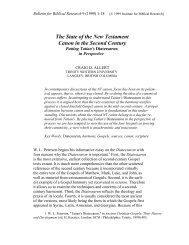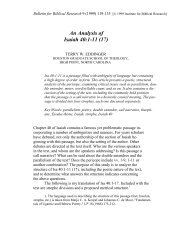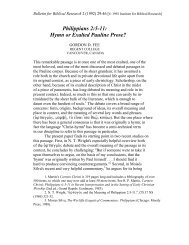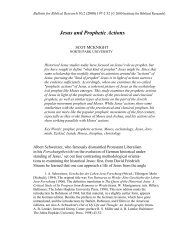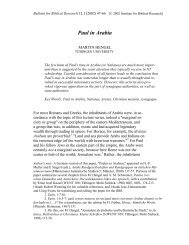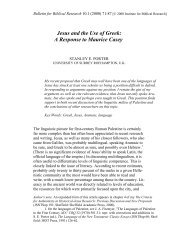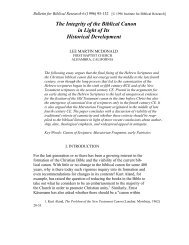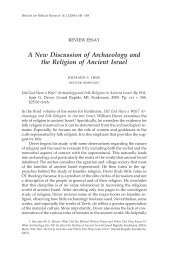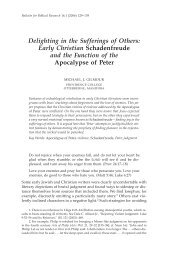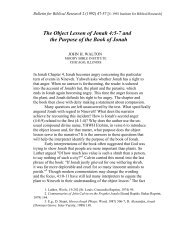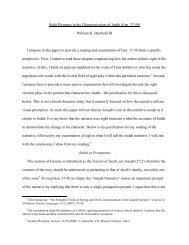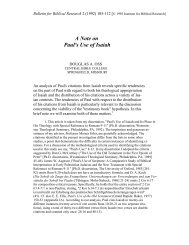Reflections on Exegesis and Spirituality in Philippians 4:10-20
Reflections on Exegesis and Spirituality in Philippians 4:10-20
Reflections on Exegesis and Spirituality in Philippians 4:10-20
Create successful ePaper yourself
Turn your PDF publications into a flip-book with our unique Google optimized e-Paper software.
Bullet<strong>in</strong> for Biblical Research 8 (1998) 75-88 [© 1998 Institute for Biblical Research]<br />
To What End <strong>Exegesis</strong>?<br />
<str<strong>on</strong>g>Reflecti<strong>on</strong>s</str<strong>on</strong>g> <strong>on</strong> <strong>Exegesis</strong> <strong>and</strong><br />
<strong>Spirituality</strong> <strong>in</strong> <strong>Philippians</strong> 4:<strong>10</strong>-<strong>20</strong><br />
GORDON D. FEE<br />
REGENT COLLEGE<br />
The purpose of this lecture, which beg<strong>in</strong>s by trac<strong>in</strong>g the author's pilgrimage<br />
as an evangelical NT scholar, is to urge that the ultimate aim of exegesis<br />
is the Spiritual <strong>on</strong>e—to produce <strong>in</strong> our lives <strong>and</strong> the lives of others true<br />
<strong>Spirituality</strong>, <strong>in</strong> which God's people live <strong>in</strong> faithful fellowship both with <strong>on</strong>e<br />
another <strong>and</strong> with the liv<strong>in</strong>g God, <strong>and</strong> thus <strong>in</strong> keep<strong>in</strong>g with God's purposes<br />
<strong>in</strong> the world. It is further argued, therefore, that the exegesis of the biblical<br />
texts bel<strong>on</strong>gs primarily <strong>in</strong> the c<strong>on</strong>text of the believ<strong>in</strong>g community who are<br />
the true heirs of these texts. These c<strong>on</strong>cerns are then illustrated by an exegesis<br />
of Phil 4:<strong>10</strong>-<strong>20</strong>, where it is argued that the predicates of friendship<br />
<strong>and</strong> orality not <strong>on</strong>ly make sense of this passage <strong>in</strong> its present placement <strong>in</strong><br />
<strong>Philippians</strong>, but are <strong>in</strong>tended likewise to lead the community <strong>in</strong>to the climactic<br />
theology <strong>and</strong> doxology of 4:19-<strong>20</strong> as the letter is read <strong>in</strong> their midst.<br />
Key Words: Phil 4:<strong>10</strong>-<strong>20</strong>, exegesis, spirituality, doxology<br />
In part this lecture 1 is someth<strong>in</strong>g of a c<strong>on</strong>fessi<strong>on</strong>al narrative of my<br />
own pilgrimage as an evangelical NT scholar. It is certa<strong>in</strong>ly not <strong>in</strong>tended<br />
to serve as a paradigm. But as those who know me well would<br />
tell you, it is hard for Gord<strong>on</strong> to do anyth<strong>in</strong>g that is not at least a bit<br />
hortatory.<br />
I. THE PILGRIMAGE<br />
The crisis event that led to this lecture occurred three years ago,<br />
when I was asked to team up with my colleague Eugene Peters<strong>on</strong> for<br />
1. This essay was given as the Annual Lecture for the Institute for Biblical Research<br />
at the annual meet<strong>in</strong>g <strong>in</strong> New Orleans <strong>on</strong> November 23, 1996. When the editor<br />
of this journal asked me to submit it for publicati<strong>on</strong>, I toyed for a l<strong>on</strong>g while over<br />
whether to t<strong>on</strong>e down some of the rhetorical features of oral speech <strong>and</strong> to give it a<br />
more academic appearance with greater <strong>in</strong>teracti<strong>on</strong> with scholarship <strong>in</strong> footnotes. In<br />
the end I decided to let it st<strong>and</strong> pretty much as delivered, with a few m<strong>in</strong>or changes<br />
here <strong>and</strong> there, <strong>and</strong> to keep <strong>on</strong>ly those notes that were already <strong>in</strong> the paper when it<br />
was delivered.
76 Bullet<strong>in</strong> for Biblical Research 8<br />
Regent's annual Pastor's C<strong>on</strong>ference. The topic had been set by those<br />
resp<strong>on</strong>sible for the c<strong>on</strong>ference: <strong>Exegesis</strong> <strong>and</strong> <strong>Spirituality</strong>. In prepar<strong>in</strong>g<br />
for those lectures, I realized that over the years I had developed<br />
a k<strong>in</strong>d of schizophrenia regard<strong>in</strong>g these two topics—schizophrenia<br />
<strong>in</strong> the derivative sense of that word: of a truly "divided m<strong>in</strong>dset."<br />
Even though I am easily the least <strong>in</strong>tenti<strong>on</strong>al NT scholar <strong>in</strong> the<br />
history of the discipl<strong>in</strong>e, I had n<strong>on</strong>etheless become <strong>on</strong>e, whether <strong>in</strong>tenti<strong>on</strong>al<br />
or not. In so do<strong>in</strong>g I had also entered <strong>in</strong>to a c<strong>on</strong>cern to<br />
restore a viable evangelical voice <strong>in</strong> the academy, where scholarship<br />
<strong>in</strong> the generati<strong>on</strong> preced<strong>in</strong>g m<strong>in</strong>e seemed pretty well committed to the<br />
agenda of modernity—to c<strong>on</strong>trol the data by means of a historicalcritical<br />
methodology, with<strong>in</strong> a n<strong>on</strong>supernatural framework, which<br />
very often <strong>in</strong>cluded a str<strong>on</strong>gly antisupernatural bias.<br />
When my generati<strong>on</strong> came <strong>on</strong> the scene, not <strong>on</strong>ly had such a bias<br />
rather totally taken over the playground, but it had also established<br />
some new rules for the game. These rules developed especially <strong>in</strong><br />
Germany, where the church had l<strong>on</strong>g been subservient to the academy.<br />
The history of evangelical faith <strong>in</strong> such an envir<strong>on</strong>ment is not a<br />
happy <strong>on</strong>e, although there were notable excepti<strong>on</strong>s <strong>in</strong> scholars like<br />
Adolf Schlatter <strong>and</strong> Joachim Jeremias. When Scripture could <strong>on</strong>ly<br />
reach the people of God by way of what the academy allowed it to<br />
say, the effect was particularly deaden<strong>in</strong>g. When these rules were<br />
transported to North America they had a still further deaden<strong>in</strong>g effect—especially<br />
<strong>in</strong> the United States, where the doctr<strong>in</strong>e of the separati<strong>on</strong><br />
of church <strong>and</strong> state was so fundamental to our psyche that no<br />
<strong>on</strong>e grow<strong>in</strong>g up <strong>in</strong> my generati<strong>on</strong> could have imag<strong>in</strong>ed a world that<br />
thought, or that should th<strong>in</strong>k, differently. This psyche dictated that<br />
the academy must be "neutral" with regard to religi<strong>on</strong> <strong>and</strong> especially<br />
must do so when look<strong>in</strong>g at religious texts.<br />
The net result was that the game had to be played <strong>on</strong> a field <strong>and</strong><br />
by a set of rules that were fundamentally foreign to the texts themselves.<br />
And here is where I entered the game that brought about my schizophrenia:<br />
I had pursued a Ph.D. <strong>in</strong> NT studies so that I might teach<br />
the NT with <strong>in</strong>tegrity <strong>in</strong> the sett<strong>in</strong>g of the church. In the process I<br />
had fallen <strong>in</strong>to scholarship. And to do my scholarly work well, I had<br />
learned to play the game by the current rules. This meant to yield to<br />
the premise that what we called Scripture, God's eternal word given<br />
<strong>in</strong> love to his people for their know<strong>in</strong>g <strong>and</strong> follow<strong>in</strong>g him, had to be<br />
treated first of all (<strong>and</strong> <strong>in</strong> the academy, exclusively) as historical documents<br />
not unlike any other such religious documents. S<strong>in</strong>ce history<br />
had always been my sec<strong>on</strong>d love, <strong>and</strong> s<strong>in</strong>ce I too believe that the first<br />
task of exegesis is the historical <strong>on</strong>e (to be as good historians as possible<br />
when deal<strong>in</strong>g with anyth<strong>in</strong>g that comes to us from an earlier<br />
time <strong>and</strong> culture), I had no trouble at all play<strong>in</strong>g the game by the
Fee: To What End <strong>Exegesis</strong>? 77<br />
rules. To be sure, my bias was basically c<strong>on</strong>servative toward all historical<br />
data—<strong>in</strong>nocent until proven guilty—<strong>and</strong> my own experience<br />
of God also biased me historically <strong>in</strong> the directi<strong>on</strong> that God had<br />
<strong>in</strong>tervened <strong>in</strong> history, the underst<strong>and</strong><strong>in</strong>g of which <strong>in</strong>terventi<strong>on</strong> I also<br />
took to be part of the historical task.<br />
My schizophrenia came about because I never for a moment<br />
believed that these texts were noth<strong>in</strong>g more than simply objects of<br />
historical research. These texts were my s<strong>in</strong>gular passi<strong>on</strong>, because<br />
here<strong>in</strong> I had been encountered by the liv<strong>in</strong>g God, who <strong>in</strong> Christ <strong>and</strong><br />
by the Spirit called me to himself to be a passi<strong>on</strong>ate lover of God.<br />
This, <strong>and</strong> this al<strong>on</strong>e, was my <strong>on</strong>ly reas<strong>on</strong> for ever becom<strong>in</strong>g an exegete:<br />
to become a better reader of the texts, so that I might both live<br />
out the life they called me to (that is, to enter <strong>in</strong>to their own <strong>Spirituality</strong><br />
2 ) <strong>and</strong> share this passi<strong>on</strong> with others. Indeed, this is the <strong>on</strong>ly<br />
way I have ever taught <strong>in</strong> over thirty years <strong>in</strong> the classroom.<br />
But it was precisely this dimensi<strong>on</strong> (my <strong>on</strong>ly reas<strong>on</strong> ever for do<strong>in</strong>g<br />
this work <strong>in</strong> the first place) that was never allowed expressi<strong>on</strong> <strong>in</strong><br />
the academy. Here we had to take the first task of exegesis not <strong>on</strong>ly<br />
as the first or even primary <strong>on</strong>e, but as the <strong>on</strong>ly <strong>on</strong>e. Anyth<strong>in</strong>g that<br />
even smacked of car<strong>in</strong>g about the <strong>Spirituality</strong> of the text—be it its<br />
own theology or its doxology or its call to discipleship—<strong>on</strong> the part<br />
of the scholar was disallowed by the present rules of the game. Thus<br />
I found myself try<strong>in</strong>g to play baseball but was allowed to play <strong>on</strong>ly<br />
by the rules of soccer, without the use of h<strong>and</strong>s <strong>and</strong> arms.<br />
As many of you will recognize, with the publicati<strong>on</strong> of my 1 Cor<strong>in</strong>thians<br />
commentary ten years ago, I ventured to start play<strong>in</strong>g by the<br />
earlier set of rules when the texts were studied primarily by scholars<br />
with<strong>in</strong> the community of faith. S<strong>in</strong>ce I had brought much of this<br />
exegesis to bear <strong>in</strong> every k<strong>in</strong>d of church sett<strong>in</strong>g <strong>and</strong> s<strong>in</strong>ce <strong>in</strong> these<br />
sett<strong>in</strong>gs I could not imag<strong>in</strong>e not ask<strong>in</strong>g <strong>and</strong> offer<strong>in</strong>g some po<strong>in</strong>ters<br />
toward soluti<strong>on</strong>s of the "so what?" questi<strong>on</strong>s, I regularly <strong>in</strong>cluded<br />
these <strong>in</strong> the commentary itself. Why do the history if the <strong>Spirituality</strong><br />
<strong>in</strong>herent <strong>in</strong> the text itself did not matter a whit? This is what I always<br />
did <strong>in</strong> the classroom, <strong>and</strong> I knew students who had taken the course<br />
<strong>in</strong> 1 Cor<strong>in</strong>thians from me would sense that I had lost my <strong>in</strong>tegrity if<br />
I did not do the same <strong>in</strong> the commentary. I also admit that I did so<br />
with a c<strong>on</strong>siderable amount of fear <strong>and</strong> trembl<strong>in</strong>g: <strong>on</strong> the <strong>on</strong>e h<strong>and</strong>,<br />
because I knew I was break<strong>in</strong>g the rules <strong>and</strong> therefore that the commentary<br />
might have a much more limited usefulness than I would<br />
have hoped; <strong>on</strong> the other h<strong>and</strong>, because I grew up <strong>in</strong> a c<strong>on</strong>text where<br />
"<strong>Spirituality</strong>" was the <strong>on</strong>ly th<strong>in</strong>g most people did with the texts, <strong>and</strong><br />
2. For my reas<strong>on</strong>s for capitaliz<strong>in</strong>g this word, see the discussi<strong>on</strong> <strong>in</strong> the next secti<strong>on</strong>,<br />
"On the Mean<strong>in</strong>g of <strong>Spirituality</strong>."
78 Bullet<strong>in</strong> for Biblical Research 8<br />
this "<strong>Spirituality</strong>" was very often based <strong>on</strong> little or no exegesis (we<br />
children used to parody a popular gospel s<strong>on</strong>g: "w<strong>on</strong>derful th<strong>in</strong>gs <strong>in</strong><br />
the Bible I see, some put there by you <strong>and</strong> some put there by me").<br />
Thus back to my preparati<strong>on</strong>s for the Pastor's C<strong>on</strong>ference. Here<br />
I was faced with the need to articulate what I believed to be the relati<strong>on</strong>ship<br />
between exegesis <strong>and</strong> <strong>Spirituality</strong>, <strong>and</strong> now I was be<strong>in</strong>g<br />
forced to come to terms with my schizophrenia. To be sure, those first<br />
attempts turned out to be much too mild: I was will<strong>in</strong>g to see exegesis<br />
<strong>and</strong> <strong>Spirituality</strong> as be<strong>in</strong>g related, as I always had <strong>in</strong> the classroom,<br />
but still to see <strong>Spirituality</strong> as a k<strong>in</strong>d of practical addendum to<br />
the exegetical task. However, a year <strong>and</strong> a half later, I was to give the<br />
Ongman lectures at the Baptist sem<strong>in</strong>ary <strong>in</strong> Örebro, Sweden, under<br />
the <strong>in</strong>vited topic, "The Word <strong>and</strong> the Spirit." Here, aga<strong>in</strong>, I was specifically<br />
asked to address the questi<strong>on</strong> of the <strong>in</strong>terface between exegesis<br />
<strong>and</strong> <strong>Spirituality</strong>.<br />
It was while prepar<strong>in</strong>g the first of these lectures that the light<br />
dawned, for between the two sets of lectures I had written the <strong>Philippians</strong><br />
commentary, which had become for me a c<strong>on</strong>stant round of<br />
Spiritual engagements with the biblical text. It f<strong>in</strong>ally became clear to<br />
me that dur<strong>in</strong>g all these years I had not been truly abid<strong>in</strong>g by my<br />
own underst<strong>and</strong><strong>in</strong>g of exegesis as I had articulated it <strong>in</strong> a variety of<br />
places <strong>and</strong> sett<strong>in</strong>gs. I have l<strong>on</strong>g argued that the first task of exegesis<br />
is to try to underst<strong>and</strong> the <strong>in</strong>tent of the author of a text, as much<br />
as this is historically possible, with all of the tools available to us as<br />
historians. And I still believe this to be so, even <strong>in</strong> this post-modern<br />
age, where scholars, full of <strong>in</strong>ner c<strong>on</strong>tradicti<strong>on</strong>s, <strong>in</strong>tenti<strong>on</strong>ally write<br />
books <strong>and</strong> articles to tell me that an author's <strong>in</strong>tent may be irrelevant<br />
to a good read<strong>in</strong>g of a book. The light that f<strong>in</strong>ally dawned, of course,<br />
was the pla<strong>in</strong> reality, writ large <strong>in</strong> almost every text <strong>in</strong> our can<strong>on</strong>, that<br />
the real <strong>in</strong>tent of these texts was the Spiritual <strong>on</strong>e: obedience to God,<br />
be it <strong>in</strong> the form of behavior, <strong>in</strong>structi<strong>on</strong>, worship, doxology, or whatever<br />
it might be, <strong>in</strong>clud<strong>in</strong>g a carefully articulated biblical theology. 3<br />
Thus, rather than see<strong>in</strong>g exegesis <strong>and</strong> <strong>Spirituality</strong> as opposed to<br />
<strong>on</strong>e another, or as <strong>on</strong>e preced<strong>in</strong>g or follow<strong>in</strong>g or hav<strong>in</strong>g precedence<br />
over the other, I came to realize—<strong>and</strong> herewith propose for our<br />
3. See the critique of "critical" exegesis by Wayne Hankey ("The Bible <strong>in</strong> a Post-<br />
Critical Age," <strong>in</strong> After the Deluge: Essays toward the Desecularizati<strong>on</strong> of the Church [ed.<br />
William Oddie; L<strong>on</strong>d<strong>on</strong>: SPCK, 1987] 41-92), who urges a return to the Fathers, who<br />
"teach that the essence of revelati<strong>on</strong> is the rais<strong>in</strong>g of the m<strong>in</strong>d of the biblical writers<br />
<strong>and</strong> of the hearers to grasp the <strong>in</strong>tellectual c<strong>on</strong>tent, the spiritual truth about God, his<br />
manner of work<strong>in</strong>g <strong>in</strong> us <strong>and</strong> his will for us, which it is the proper aim of Scripture<br />
to communicate" (p. 83). While I agree with the spirit of this comment, Hankey also<br />
reflects a far too sangu<strong>in</strong>e attitude toward the Fathers. Indeed, this book is a bit of a<br />
mixed bag, s<strong>in</strong>ce the next essay by Roger Beckwith ("Not <strong>in</strong> the Wisdom of Men")<br />
ir<strong>on</strong>ically argues <strong>on</strong> the basis of a highly questi<strong>on</strong>able "critical" exegesis of 1 Cor<strong>in</strong>thians<br />
2 for a pre-critical underst<strong>and</strong><strong>in</strong>g of the biblical text.
FEE: To What End <strong>Exegesis</strong>? 79<br />
mutual c<strong>on</strong>siderati<strong>on</strong>: (1) that faithful biblical exegesis must, by the<br />
very nature of the documents themselves, always take <strong>in</strong>to account<br />
the Spiritual purposes for which they were written, <strong>and</strong> (2) that this<br />
exegesis bel<strong>on</strong>gs with<strong>in</strong> the framework of the believ<strong>in</strong>g community,<br />
with those who follow (whether exactly or not, at least <strong>in</strong>tenti<strong>on</strong>ally)<br />
<strong>in</strong> the tra<strong>in</strong> of the orig<strong>in</strong>al believ<strong>in</strong>g communities for whom <strong>and</strong> to<br />
whom these documents were written.<br />
Thus let us say with uncharacteristic passi<strong>on</strong>: the ultimate aim of<br />
exegesis (as I perceive it) is to produce <strong>in</strong> our lives <strong>and</strong> the lives of<br />
others true <strong>Spirituality</strong>, <strong>in</strong> which God's people live <strong>in</strong> faithful fellowship<br />
both with <strong>on</strong>e another <strong>and</strong> with the eternal <strong>and</strong> liv<strong>in</strong>g God <strong>and</strong><br />
thus <strong>in</strong> keep<strong>in</strong>g with God's own purposes <strong>in</strong> the world. In order to do<br />
this effectively, I would further argue (but will not take the time to<br />
do so here), true "<strong>Spirituality</strong>" must precede exegesis as well as be the<br />
f<strong>in</strong>al result of it. We must beg<strong>in</strong> as we would c<strong>on</strong>clude, st<strong>and</strong><strong>in</strong>g under<br />
the text, not over it with all of our scholarly arrogance <strong>in</strong>tact. And<br />
we must end that way as well, or all is vanity, chas<strong>in</strong>g after the w<strong>in</strong>d.<br />
I would therefore make bold to <strong>in</strong>sist that proper exegesis should<br />
be d<strong>on</strong>e <strong>in</strong> the c<strong>on</strong>text of prayer, so that <strong>in</strong> our exegesis we hear the<br />
text with the sensitivity of the Spirit. Only as we ourselves do our<br />
exegesis <strong>in</strong> the proper posture of humility—<strong>on</strong> our knees, as it were,<br />
listen<strong>in</strong>g to God—can we truly expect to speak the Word of God with<br />
clarity <strong>and</strong> boldness so as to comfort, <strong>in</strong>spire, or speak prophetically<br />
to God's people, the people for whom these texts were written <strong>in</strong> the<br />
first place.<br />
So with this c<strong>on</strong>fessi<strong>on</strong> <strong>and</strong> proposal before us as the c<strong>on</strong>text of<br />
this lecture, what I hope to do <strong>in</strong> the space that rema<strong>in</strong>s is to illustrate<br />
what some of this might look like by look<strong>in</strong>g at a specific passage,<br />
Phil 4:<strong>10</strong>-<strong>20</strong>, <strong>and</strong> assess<strong>in</strong>g its role <strong>in</strong> Paul's letter to the <strong>Philippians</strong>.<br />
I beg<strong>in</strong> with a few words about the term <strong>Spirituality</strong>.<br />
II. ON THE MEANING OF SPIRITUALITY 4<br />
As the result of my work <strong>on</strong> the pneu=ma word group <strong>in</strong> the letters of<br />
Pau1, 5 I have found myself becom<strong>in</strong>g more <strong>and</strong> more distressed by<br />
our translat<strong>in</strong>g of the adjective pneumatiko/j with a small-case letter,<br />
"spiritual." Indeed, the word spiritual is what I call an accordi<strong>on</strong> word:<br />
its mean<strong>in</strong>g pretty much has to do with how much air you pump <strong>in</strong><br />
4. Some of this material has already appeared <strong>in</strong> my "<strong>Exegesis</strong> <strong>and</strong> <strong>Spirituality</strong>:<br />
<str<strong>on</strong>g>Reflecti<strong>on</strong>s</str<strong>on</strong>g> <strong>on</strong> Complet<strong>in</strong>g the Exegetical Circle," Crux 31 (1995) 29-35, which was the<br />
published versi<strong>on</strong> of the first of the Ongman Lectures noted above. These lectures<br />
were given aga<strong>in</strong> <strong>in</strong> somewhat altered form as the Huber Drumwright Lectures at the<br />
Southwestern Baptist Theological Sem<strong>in</strong>ary <strong>in</strong> October 1995.<br />
5. See my God's Empower<strong>in</strong>g Presence: The Holy Spirit <strong>in</strong> the Letters of Paul (Peabody:<br />
Hendricks<strong>on</strong>, 1994), especially the analysis of the word group <strong>in</strong> chap. 2.
80 Bullet<strong>in</strong> for Biblical Research 8<br />
or out of it. The po<strong>in</strong>t that needs to be made is that the word pneumatiko/j,<br />
a dist<strong>in</strong>ctively Paul<strong>in</strong>e word <strong>in</strong> the NT, has the Holy Spirit as its<br />
primary referent. As an adjective Paul never uses it anthropologically<br />
to refer to the human spirit; <strong>and</strong> whatever else, it is not an adjective<br />
that sets some unseen reality <strong>in</strong> c<strong>on</strong>trast, for example, to someth<strong>in</strong>g<br />
material, secular, ritual, or tangible. 6<br />
In the NT, therefore, <strong>Spirituality</strong> is def<strong>in</strong>ed altogether <strong>in</strong> terms of<br />
the Spirit of God. One is Spiritual to the degree that <strong>on</strong>e lives <strong>in</strong> <strong>and</strong><br />
walks by the Spirit; <strong>in</strong> Scripture the word has no other mean<strong>in</strong>g, <strong>and</strong><br />
no other measurement. Thus, when Paul says that "the Law is spiritual,"<br />
he means that the Law bel<strong>on</strong>gs to the sphere of the Spirit (<strong>in</strong>spired<br />
of the Spirit as it is), not to the sphere of flesh. And when he<br />
says to the Cor<strong>in</strong>thians (14:27), "if any of you th<strong>in</strong>ks he or she is spiritual,"<br />
he means, "if any of you th<strong>in</strong>k of yourselves as a Spirit pers<strong>on</strong>,<br />
a pers<strong>on</strong> liv<strong>in</strong>g the life of the Spirit." Likewise, when he says to the<br />
Galatians (6:1) that "those who are spiritual should restore <strong>on</strong>e who<br />
has been overtaken <strong>in</strong> a transgressi<strong>on</strong>," he is not referr<strong>in</strong>g to some<br />
special or elitist group <strong>in</strong> the church, but to the rest of the believ<strong>in</strong>g<br />
community, who both began their life <strong>in</strong> the Spirit <strong>and</strong> came to completi<strong>on</strong><br />
by the same Spirit who produces his own fruit <strong>in</strong> their lives.<br />
Christian existence <strong>in</strong> the NT is thus Tr<strong>in</strong>itarian at its very roots.<br />
At the beg<strong>in</strong>n<strong>in</strong>g <strong>and</strong> end of all th<strong>in</strong>gs is the eternal God, to whom<br />
both Jews <strong>and</strong> Christians refer over <strong>and</strong> aga<strong>in</strong> as the Liv<strong>in</strong>g God.<br />
God's purpose <strong>in</strong> creat<strong>in</strong>g creatures like ourselves, fashi<strong>on</strong>ed <strong>in</strong> his<br />
image, was for relati<strong>on</strong>ship: that we might live <strong>in</strong> fellowship with<br />
<strong>and</strong> thus to the glory of the Liv<strong>in</strong>g God, both as those who bear God's<br />
likeness <strong>and</strong> as those who carry out God's purposes <strong>on</strong> earth. Even<br />
before the fall, we are told, God's purpose was to redeem the fallen<br />
so as to reshape their misshapen visi<strong>on</strong> of God <strong>and</strong> thus to restore<br />
them <strong>in</strong>to the fellowship from which they fell <strong>in</strong> their rebelli<strong>on</strong>. God<br />
has brought this about, we are told, by himself com<strong>in</strong>g am<strong>on</strong>g us <strong>in</strong><br />
the pers<strong>on</strong> of his S<strong>on</strong>, who at <strong>on</strong>e po<strong>in</strong>t <strong>in</strong> our human history effected<br />
our redempti<strong>on</strong> <strong>and</strong> rec<strong>on</strong>ciliati<strong>on</strong> with the Liv<strong>in</strong>g God, through a<br />
humiliat<strong>in</strong>g death <strong>and</strong> glorious resurrecti<strong>on</strong>. But God has not left us<br />
<strong>on</strong> our own to make a go of it; he has purposed to come to our aid—<br />
<strong>and</strong> this is the reas<strong>on</strong> for God's com<strong>in</strong>g to us <strong>and</strong> am<strong>on</strong>g us by the<br />
Holy Spirit.<br />
6. What this means, of course, is that much that has come under this rubric both<br />
<strong>in</strong> the secular world <strong>and</strong> <strong>in</strong> Christian history is much more Greek <strong>in</strong> its basic orientati<strong>on</strong><br />
than it is biblical. For a recent brief overview of a positi<strong>on</strong> similar to m<strong>in</strong>e, see<br />
Inagrace Dietterich, "What is <strong>Spirituality</strong>?" The Gospel <strong>and</strong> Our Culture 8/3 (September<br />
1996) 1-3, 8 [repr. from The Center Letter, published by The Center for Parish Development,<br />
Chicago].
FEE: To What End <strong>Exegesis</strong>? 81<br />
Thus God's aim <strong>in</strong> our lives is "Spiritual" <strong>in</strong> this sense: that we,<br />
redeemed by the death of Christ, might be empowered by his Spirit<br />
both "to will <strong>and</strong> to do for the sake of his own pleasure." True spirituality,<br />
therefore, is noth<strong>in</strong>g more or less than life by the Spirit.<br />
"Hav<strong>in</strong>g been brought to life by the Spirit," Paul tells the Galatians,<br />
"let us behave <strong>in</strong> ways that are <strong>in</strong> keep<strong>in</strong>g with the Spirit."<br />
Hence the aim of exegesis: to produce <strong>in</strong> our lives <strong>and</strong> the lives of<br />
others true <strong>Spirituality</strong>, <strong>in</strong> which God's people live <strong>in</strong> fellowship with<br />
the eternal <strong>and</strong> liv<strong>in</strong>g God <strong>and</strong> thus <strong>in</strong> keep<strong>in</strong>g with God's own purposes<br />
<strong>in</strong> the world. Thus it is simply wr<strong>on</strong>g-headed for us ever to<br />
th<strong>in</strong>k that we have d<strong>on</strong>e exegesis at all if we have not cared about<br />
the <strong>in</strong>tended <strong>Spirituality</strong> of the text—whether it be theological, doxological,<br />
relati<strong>on</strong>al, or behavioral.<br />
Now <strong>on</strong> to such an exegesis of Phil 4:<strong>10</strong>-<strong>20</strong>.<br />
III. PHILIPPIANS 4:<strong>10</strong>-<strong>20</strong> 7<br />
Let me beg<strong>in</strong> with the scholarly agenda, which <strong>in</strong> this case I f<strong>in</strong>d very<br />
often to be <strong>in</strong> the way of both underst<strong>and</strong><strong>in</strong>g <strong>and</strong> <strong>Spirituality</strong>. Scholarship<br />
has tended to have two difficulties with Phil 4:<strong>10</strong>-<strong>20</strong>, <strong>and</strong><br />
these difficulties by <strong>and</strong> large dom<strong>in</strong>ate the exegetical discussi<strong>on</strong> of<br />
this passage: (1) Its placement at the end of the letter. "It is <strong>in</strong>c<strong>on</strong>ceivable,"<br />
we are told, "that Paul should wait all that time to express his<br />
thanks for the gifts." 8 (2) The tw<strong>in</strong> realities (a) that Paul never actually<br />
thanks the <strong>Philippians</strong> for the gift (<strong>in</strong> the sense of us<strong>in</strong>g the verb<br />
eu)xaristei=n) <strong>and</strong> (b) that he uses an array of commercial language to<br />
express his acknowledgment.<br />
For those who are troubled by these th<strong>in</strong>gs, a variety of soluti<strong>on</strong>s<br />
have been offered. The most comm<strong>on</strong> soluti<strong>on</strong> to the questi<strong>on</strong> of placement<br />
is to divide the present letter <strong>in</strong>to three, mak<strong>in</strong>g our 4:<strong>10</strong>-<strong>20</strong> the<br />
earliest of the three, dashed off so<strong>on</strong> after Epaphroditus had arrived,<br />
<strong>and</strong> placed somewhat thoughtlessly at the end by a redactor. 9 The<br />
7. For more detailed argumentati<strong>on</strong> of many of these po<strong>in</strong>ts, see my commentary<br />
<strong>on</strong> <strong>Philippians</strong> (NICNT; Gr<strong>and</strong> Rapids: Eerdmans, 1995). In fact, some of the exegesis<br />
<strong>in</strong> the latter part of this secti<strong>on</strong> is lifted almost en toto out of the commentary, <strong>in</strong> part<br />
to illustrate the very po<strong>in</strong>ts be<strong>in</strong>g argued <strong>in</strong> this essay.<br />
8. F. W Beare, A Commentary <strong>on</strong> the Epistle to the <strong>Philippians</strong> (L<strong>on</strong>d<strong>on</strong>: Black, 1959)<br />
150.<br />
9. This has always struck me as an unusual "soluti<strong>on</strong>," s<strong>in</strong>ce it solves noth<strong>in</strong>g, <strong>and</strong><br />
<strong>on</strong>ly puts the problem back <strong>on</strong>e remove from Paul. As I suggest <strong>in</strong> the commentary, this<br />
seems more like a va<strong>in</strong> attempt to ex<strong>on</strong>erate Paul, s<strong>in</strong>ce we cannot really imag<strong>in</strong>e that<br />
Paul would have written differently from our "better selves." That is, s<strong>in</strong>ce we would<br />
have written it <strong>on</strong>e way, therefore Paul also must write that way. But somehow it is<br />
perfectly all right to attribute what we deem "improper" <strong>on</strong> the part of Paul to "m<strong>in</strong>dlessness"<br />
<strong>on</strong> the part of a redactor, who might rather have been the <strong>on</strong>e whom we<br />
should suspect of more thoughtfulness.
82 Bullet<strong>in</strong> for Biblical Research 8<br />
soluti<strong>on</strong> to the l<strong>in</strong>guistic matters has basically been to describe the<br />
passage as "thankless thanks," <strong>and</strong> then to "mirror read" some form<br />
of tensi<strong>on</strong> between Paul <strong>and</strong> the <strong>Philippians</strong> as ly<strong>in</strong>g beh<strong>in</strong>d his <strong>in</strong>ability<br />
genu<strong>in</strong>ely to thank them.<br />
But such resoluti<strong>on</strong>s are completely unnecessary <strong>in</strong> this case, because<br />
the problem is of our own mak<strong>in</strong>g, result<strong>in</strong>g from read<strong>in</strong>g our<br />
own sociology <strong>and</strong> cultural norms back <strong>in</strong>to Paul's letter. Both matters<br />
f<strong>in</strong>d their resoluti<strong>on</strong> at two po<strong>in</strong>ts: first, <strong>in</strong> the phenomen<strong>on</strong> of<br />
Greco-Roman friendship, tak<strong>in</strong>g seriously the fact that our <strong>Philippians</strong><br />
is <strong>in</strong> part a letter of friendship (as well as <strong>in</strong> part a letter of moral<br />
exhortati<strong>on</strong>). <strong>10</strong> Understood <strong>in</strong> light of the "rules" of friendship—<br />
their sociology, if you will, not ours—both its placement <strong>and</strong> language<br />
make perfectly good sense. Sec<strong>on</strong>d, its placement <strong>in</strong> particular is best<br />
understood aga<strong>in</strong>st the backdrop of orality <strong>and</strong> Paul<strong>in</strong>e rhetoric.<br />
I do not have time to go <strong>in</strong>to the phenomen<strong>on</strong> of friendship <strong>in</strong><br />
Greco-Roman culture, except to outl<strong>in</strong>e briefly what is significant for<br />
our passage (the details can be found <strong>in</strong> my commentary):<br />
1. Greco-Roman culture took friendship far more seriously than most<br />
Western cultures—so much so, that many of the philosophers,<br />
beg<strong>in</strong>n<strong>in</strong>g with Aristotle, have c<strong>on</strong>siderable treatises <strong>on</strong> the nature<br />
<strong>and</strong> obligati<strong>on</strong>s of friendship.<br />
2. Friendship was of several k<strong>in</strong>ds; but between equals, the highest<br />
level (to cite Aristotle) was between virtuous people, whose relati<strong>on</strong>ship<br />
was based <strong>on</strong> goodwill <strong>and</strong> loyalty (<strong>in</strong>clud<strong>in</strong>g trust).<br />
3. A c<strong>on</strong>siderable "core of ideals" was understood to be <strong>in</strong>herent <strong>in</strong><br />
such friendship, most of which appear <strong>in</strong> some way or another <strong>in</strong><br />
<strong>Philippians</strong>. Absolutely basic to every<strong>on</strong>e's underst<strong>and</strong><strong>in</strong>g of friendship<br />
<strong>and</strong> crucial to the passage <strong>in</strong> h<strong>and</strong> was the matter of social reciprocity,<br />
<strong>in</strong> which, us<strong>in</strong>g the language of commerce metaphorically,<br />
they spoke of mutually "giv<strong>in</strong>g <strong>and</strong> receiv<strong>in</strong>g benefits." This matter<br />
of "benefits" called for some of the lengthiest philosophical discussi<strong>on</strong>s,<br />
because friendship could not be understood apart from<br />
"benefits." By their very nature, however, benefits could also be<br />
abused so as to underm<strong>in</strong>e mutuality <strong>and</strong> trust.<br />
It is this language, the language of "c<strong>on</strong>tractual friendship," that<br />
both dom<strong>in</strong>ates Phil 4:<strong>10</strong>-<strong>20</strong> <strong>and</strong> helps to expla<strong>in</strong> why Paul does not<br />
use "thank you" language <strong>in</strong> a direct way. We know from the literary<br />
evidence that although gratitude for benefits received was an ex-<br />
<strong>10</strong>. On this questi<strong>on</strong> see the <strong>in</strong>troducti<strong>on</strong> to my <strong>Philippians</strong> commentary (pp. 2-<br />
7) <strong>and</strong> the further bibliography found <strong>in</strong> n. 16 (p. 4).
FEE: To What End <strong>Exegesis</strong>? 83<br />
pected part of friendship, n<strong>on</strong>etheless, because of both the mutuality<br />
<strong>and</strong> goodwill <strong>in</strong>herent <strong>in</strong> friendship <strong>and</strong> its expected reciprocity with<br />
regard to benefits, the use of "thank you" language was apparently<br />
not expected am<strong>on</strong>g friends. 11<br />
If the social phenomen<strong>on</strong> of friendship expla<strong>in</strong>s the language of<br />
our passage, its placement at the end of the letter is most likely due to<br />
the comb<strong>in</strong>ed <strong>in</strong>fluence of orality <strong>and</strong> Paul<strong>in</strong>e rhetoric. We beg<strong>in</strong><br />
with the matter of orality, not<strong>in</strong>g that the first century CE was primarily<br />
an oral (<strong>and</strong> thus aural) culture. This would have been especially<br />
true for the majority to whom this letter was addressed. All of<br />
Paul's letters, <strong>and</strong> <strong>Philippians</strong> <strong>in</strong> particular, were first of all oral—dictated<br />
to be read aloud <strong>in</strong> the community. Much of Paul's rhetoric comes<br />
<strong>in</strong>to play precisely at this po<strong>in</strong>t. His use of ass<strong>on</strong>ance <strong>and</strong> wordplays,<br />
for example, are "designed" to be memorable precisely because oral<br />
cultures had a very high level of retenti<strong>on</strong>. In literary cultures we are<br />
bombarded by so many words <strong>in</strong> pr<strong>in</strong>t that very few, if any, are kept<br />
<strong>in</strong> memory <strong>in</strong> a precise way.<br />
Rhetoric <strong>and</strong> orality together especially expla<strong>in</strong> why Paul left his<br />
acknowledgment of their gift for the very end. For most of us, such<br />
delay borders <strong>on</strong> rudeness, if not impropriety, <strong>and</strong> for scholars it has<br />
been the source of c<strong>on</strong>siderable speculati<strong>on</strong>. But Paul had a different<br />
agenda. Hav<strong>in</strong>g to this po<strong>in</strong>t dealt with his, <strong>and</strong> especially their, circumstances<br />
12 (basic to letters of friendship) <strong>and</strong> know<strong>in</strong>g full well<br />
what he was do<strong>in</strong>g, Paul c<strong>on</strong>cluded the letter <strong>on</strong> the same note with<br />
which it began (1:3-7), their mutual partnership <strong>in</strong> the gospel, thus<br />
plac<strong>in</strong>g this matter <strong>in</strong> the emphatic, climactic positi<strong>on</strong> at the end.<br />
When read aloud <strong>in</strong> the gathered community, these would be the<br />
f<strong>in</strong>al words that were left r<strong>in</strong>g<strong>in</strong>g <strong>in</strong> their ears: their gift to him has<br />
been a sweet-smell<strong>in</strong>g sacrifice, pleas<strong>in</strong>g to God; God <strong>in</strong> turn, through<br />
Christ Jesus <strong>and</strong> <strong>in</strong> keep<strong>in</strong>g with the "riches" that are his al<strong>on</strong>e <strong>in</strong> the<br />
"glory" <strong>in</strong> which he dwells, will "fill them to the full" regard<strong>in</strong>g all<br />
their needs; <strong>and</strong> that all of this redounds to God's eternal glory.<br />
At the same time, of course, they would scarcely be able to overlook<br />
the exhortati<strong>on</strong>s <strong>and</strong> appeals that preceded, given the predom<strong>in</strong>ance<br />
of these c<strong>on</strong>cerns <strong>in</strong> the large middle secti<strong>on</strong> of the letter. This<br />
is rhetoric at its best. The theory (predicated <strong>on</strong> our own sociology)<br />
that sees a later, rather m<strong>in</strong>dless, redactor "past<strong>in</strong>g" th<strong>in</strong>gs together<br />
<strong>in</strong> this way turns out <strong>in</strong> the end to make him more clever than Paul.<br />
11. See esp. Gerald W. Peterman, "'Thankless Thanks': The Epistolary Social<br />
C<strong>on</strong>venti<strong>on</strong> <strong>in</strong> <strong>Philippians</strong> 4:<strong>10</strong>-<strong>20</strong>," TynB (1991) 261-70.<br />
12. Here especially <strong>on</strong>e needs to note the repeated phrase ta_ peri_ (kata_) u(mw=n (e)me/)<br />
(1:12, 27; 2:19, 23), which is precisely the stuff of letters of friendship. See the discussi<strong>on</strong><br />
<strong>in</strong> my <strong>Philippians</strong> commentary, p. 3 <strong>and</strong> n. 17 <strong>on</strong> 1:12.
84 Bullet<strong>in</strong> for Biblical Research 8<br />
In this f<strong>in</strong>al secti<strong>on</strong>, therefore, three c<strong>on</strong>cerns <strong>in</strong>tertw<strong>in</strong>e: First is<br />
his genu<strong>in</strong>e gratitude for their recent gift, expressed three times <strong>in</strong><br />
three variati<strong>on</strong>s (vv. <strong>10</strong>a, 14, 18). Sec<strong>on</strong>d, this is set with<strong>in</strong> the framework<br />
of Greco-Roman "friendship," evidenced by the language of<br />
"giv<strong>in</strong>g <strong>and</strong> receiv<strong>in</strong>g," a relati<strong>on</strong>ship of friendship that goes back<br />
to the beg<strong>in</strong>n<strong>in</strong>g of their relati<strong>on</strong>ship together <strong>in</strong> Christ. Third, <strong>and</strong><br />
most significantly (<strong>and</strong> typically!), this sociological reality is totally<br />
subsumed under the greater reality of the gospel; thus the whole climaxes<br />
<strong>in</strong> doxology.<br />
All of this secti<strong>on</strong> is fashi<strong>on</strong>ed with c<strong>on</strong>summate artistry, so that<br />
their "giv<strong>in</strong>g," his "receiv<strong>in</strong>g," <strong>and</strong> their l<strong>on</strong>g-term friendship (expressed<br />
as a "partnership <strong>in</strong> the gospel"), which their gift reaffirms,<br />
climax <strong>in</strong> vv. 18-<strong>20</strong> with gratitude (from Paul), accolade <strong>and</strong> promise<br />
(from God to them), <strong>and</strong> doxology (from both him <strong>and</strong> them to God).<br />
In order to get at my c<strong>on</strong>cern about the <strong>in</strong>tended <strong>Spirituality</strong> of the<br />
passage, I want to focus <strong>on</strong> this climactic moment <strong>in</strong> the letter.<br />
In v. 18 Paul at last menti<strong>on</strong>s their gifts directly. He speaks expansively,<br />
pil<strong>in</strong>g up verbs at the beg<strong>in</strong>n<strong>in</strong>g by which he <strong>in</strong>dicates how<br />
richly his own needs have been met by their lavish generosity <strong>and</strong><br />
c<strong>on</strong>clud<strong>in</strong>g with a change of metaphors express<strong>in</strong>g God's pleasure<br />
over their gift. The first clause, "I have received (payment) <strong>in</strong> full,"<br />
reflects his f<strong>in</strong>al use of the commercial/friendship metaphor, <strong>in</strong>dicat<strong>in</strong>g<br />
that his "receipt" of what they have "given" puts the "obligati<strong>on</strong>"<br />
of friendship back <strong>on</strong> his side.<br />
As further <strong>in</strong>dicati<strong>on</strong> that this passage is not "thankless," Paul<br />
starts all over aga<strong>in</strong>. "I am filled to the full," he says, <strong>and</strong> then menti<strong>on</strong>s<br />
their gift directly. But <strong>in</strong> do<strong>in</strong>g so, he describes their gift by<br />
means of rich metaphor from the OT sacrifices ("a fragrant offer<strong>in</strong>g,<br />
an acceptable sacrifice"), so as also to <strong>in</strong>dicate div<strong>in</strong>e approval for<br />
what they have d<strong>on</strong>e. What was for them an expressi<strong>on</strong> of friendship<br />
<strong>and</strong> for Paul was both evidence of their partnership <strong>in</strong> the gospel<br />
<strong>and</strong> the cause of his present "abound<strong>in</strong>g" while <strong>in</strong> pris<strong>on</strong> is f<strong>in</strong>ally<br />
described as a sacrificial offer<strong>in</strong>g to God, <strong>in</strong> which God himself took<br />
full pleasure.<br />
The menti<strong>on</strong> of God at the end of v. 18 leads directly to the great<br />
master stroke, v. 19. The reciprocity of friendship is now back <strong>in</strong><br />
Paul's court. But Paul is <strong>in</strong> pris<strong>on</strong> <strong>and</strong> cannot reciprocate directly. So<br />
he does an even better th<strong>in</strong>g: s<strong>in</strong>ce their gift had the effect of be<strong>in</strong>g<br />
a sweet-smell<strong>in</strong>g sacrifice, pleas<strong>in</strong>g to God, Paul assures them that<br />
God, whom he deliberately designates "my God," will assume resp<strong>on</strong>sibility<br />
for reciprocity. Thus, pick<strong>in</strong>g up the language "my need"<br />
from v. 16 <strong>and</strong> "fill to the full" from v. 18, he promises them that "my<br />
God will fill up every need of yours."
FEE: To What End <strong>Exegesis</strong>? 85<br />
From his po<strong>in</strong>t of view they obviously have the better of it! First,<br />
he promises that God's reciprocati<strong>on</strong> will cover “every need” of theirs,<br />
especially their material needs, as the c<strong>on</strong>text dem<strong>and</strong>s, <strong>and</strong> also<br />
every other k<strong>in</strong>d of need, as the language dem<strong>and</strong>s. One cannot<br />
imag<strong>in</strong>e a more fitt<strong>in</strong>g way for this letter to c<strong>on</strong>clude, <strong>in</strong> terms of<br />
Paul's f<strong>in</strong>al word to them pers<strong>on</strong>ally. In the midst of their "poverty"<br />
(2 Cor 8:2), God will richly supply their material needs. In their present<br />
suffer<strong>in</strong>g <strong>in</strong> the face of oppositi<strong>on</strong> (1:27-30), God will richly supply<br />
what is needed (steadfastness, joy, <strong>and</strong> encouragement). In their<br />
"need" to advance <strong>in</strong> the faith with <strong>on</strong>e m<strong>in</strong>dset (1:25, 2:1-4, 4:2-3),<br />
God will richly supply the grace <strong>and</strong> humility necessary. In the place<br />
of both "grumbl<strong>in</strong>g" (2:14) <strong>and</strong> "anxiety" (4:6), God will be present<br />
with them as the "God of peace" (4:7, 9). "My God," Paul says, will act<br />
for me <strong>in</strong> your behalf by "fill<strong>in</strong>g to the full all your needs."<br />
And God will do so, Paul says, "<strong>in</strong> keep<strong>in</strong>g with his riches <strong>in</strong><br />
glory <strong>in</strong> Christ Jesus." The <strong>Philippians</strong>' generosity toward Paul, expressed<br />
lavishly <strong>in</strong> the beg<strong>in</strong>n<strong>in</strong>g of v. 18, is exceeded bey<strong>on</strong>d all<br />
imag<strong>in</strong>ati<strong>on</strong> by the lavish "wealth" of the eternal God, who dwells<br />
"<strong>in</strong> glory" full of "riches" made available to his own "<strong>in</strong> Christ Jesus."<br />
God's "riches" are those <strong>in</strong>herent to his be<strong>in</strong>g God, Creator <strong>and</strong> Lord<br />
of all; noth<strong>in</strong>g lies outside his rightful ownership <strong>and</strong> doma<strong>in</strong>. They<br />
are his "<strong>in</strong> glory" <strong>in</strong> the sense that his "riches" exist <strong>in</strong> the sphere of<br />
God's glory, where God "dwells" <strong>in</strong> <strong>in</strong>f<strong>in</strong>ite splendor <strong>and</strong> majesty, the<br />
"glory" that is his as God al<strong>on</strong>e. It is "<strong>in</strong> keep<strong>in</strong>g with" all of this—<br />
not "out of" his riches, but <strong>in</strong> accordance with this norm, the <strong>in</strong>f<strong>in</strong>ite<br />
"riches" of grace that bel<strong>on</strong>g to God's own glory—that God's full<br />
supply will come their way to meet their every need. The language is<br />
deliberately expansive; after all, Paul is try<strong>in</strong>g to say someth<strong>in</strong>g c<strong>on</strong>crete<br />
about the eternal God <strong>and</strong> God's relati<strong>on</strong>ship to his people. This<br />
is why the f<strong>in</strong>al word is not the heavenly <strong>on</strong>e, "<strong>in</strong> glory," but the comb<strong>in</strong>ed<br />
earthly <strong>and</strong> heavenly <strong>on</strong>e, "<strong>in</strong> Christ Jesus." Because Paul has<br />
beheld the "glory of God <strong>in</strong> the face of Christ Jesus" (2 Cor 4:6), expressed<br />
<strong>in</strong> this letter <strong>in</strong> the majestic Christ narrative <strong>in</strong> 2:6-11, Paul<br />
sees clearly that Christ Jesus is the way God has made his love known<br />
<strong>and</strong> available to his human creatures. This is what the letter has ultimately<br />
been all about. It began "<strong>in</strong> Christ Jesus"; it now c<strong>on</strong>cludes<br />
"<strong>in</strong> Christ Jesus." For Paul, "to live is Christ, <strong>and</strong> to die is ga<strong>in</strong>." Thus<br />
the f<strong>in</strong>al word <strong>in</strong> the body of the letter proper is this <strong>on</strong>e: "every need<br />
of yours <strong>in</strong> keep<strong>in</strong>g with the wealth that is God's <strong>in</strong> glory made available<br />
to you <strong>in</strong> Christ Jesus."<br />
This says it all; noth<strong>in</strong>g more can be added, so Paul simply bursts<br />
<strong>in</strong>to doxology. The <strong>in</strong>dicative yields to the imperative of worship.<br />
When <strong>on</strong>e th<strong>in</strong>ks <strong>on</strong> the "riches of God" lavished <strong>on</strong> us <strong>in</strong> Christ
86 Bullet<strong>in</strong> for Biblical Research 8<br />
Jesus, what else is there to do but to praise <strong>and</strong> worship? Christ is <strong>in</strong>deed<br />
the focus of everyth<strong>in</strong>g that God has <strong>and</strong> is do<strong>in</strong>g <strong>in</strong> this world<br />
<strong>and</strong> the next, but God the Father is always the first <strong>and</strong> last word <strong>in</strong><br />
Paul's theology. "My God" is now "our God <strong>and</strong> Father"; <strong>and</strong> the liv<strong>in</strong>g<br />
God, the everlast<strong>in</strong>g <strong>on</strong>e, who bel<strong>on</strong>gs to the "ages of ages" <strong>and</strong> who<br />
dwells "<strong>in</strong> glory," is now ascribed the "glory" that is due his name.<br />
All of this because the <strong>Philippians</strong> have sent Paul material assistance<br />
to help him through his impris<strong>on</strong>ment! True theology is expressed <strong>in</strong><br />
doxology, <strong>and</strong> doxology is always the proper resp<strong>on</strong>se to God, even--<br />
especially?—<strong>in</strong> resp<strong>on</strong>se to God's prompt<strong>in</strong>g friends to m<strong>in</strong>ister to<br />
friends.<br />
IV. FINAL REFLECTIONS ON SPIRITUALITY<br />
What, then, is the <strong>Spirituality</strong> that Paul <strong>in</strong>tends the <strong>Philippians</strong> to<br />
enter <strong>in</strong>to by these words? The answer, I would suggest, lies with the<br />
doxology. Surely we have not read the text aright until we recognize<br />
that Paul <strong>in</strong>tended the <strong>Philippians</strong>—<strong>and</strong> therefore us as heirs of their<br />
text—to jo<strong>in</strong> him <strong>in</strong> this praise of God. Besides the implied imperative<br />
<strong>in</strong> the doxology itself, two th<strong>in</strong>gs lead me to argue so.<br />
First, as noted above, these words of doxology c<strong>on</strong>clude a letter<br />
that is <strong>in</strong>tended to be read aloud <strong>in</strong> the gathered community <strong>in</strong> Philippi.<br />
For most of us this is simply a text that is read silently <strong>and</strong> understood<br />
descriptively as br<strong>in</strong>g<strong>in</strong>g c<strong>on</strong>clusi<strong>on</strong> to the letter proper. For<br />
many of us praise also tends to be perfunctory. It was otherwise with<br />
Paul. He bel<strong>on</strong>ged to a traditi<strong>on</strong> that regularly blessed God <strong>in</strong> its worship,<br />
which <strong>in</strong> its Christian expressi<strong>on</strong> was rooted <strong>in</strong> the salvati<strong>on</strong><br />
that God had brought about <strong>in</strong> Christ <strong>and</strong> made effectual through the<br />
Spirit. S<strong>in</strong>ce "rejoic<strong>in</strong>g <strong>in</strong> the Lord" was enjo<strong>in</strong>ed <strong>on</strong> them <strong>in</strong> the hymnbook<br />
of the ancient people of God, how much more was it enjo<strong>in</strong>ed<br />
<strong>on</strong> them as their proper resp<strong>on</strong>se to Christ's lavish grace. Rejoic<strong>in</strong>g is<br />
precisely what Paul repeatedly urges throughout the letter. "Rejoice<br />
<strong>in</strong> the Lord," he exhorts, "<strong>and</strong> aga<strong>in</strong> I will say it, Rejoice." Thus the<br />
c<strong>on</strong>clud<strong>in</strong>g doxology is <strong>in</strong>tended <strong>in</strong> part to lead them to rejoic<strong>in</strong>g.<br />
Sec<strong>on</strong>d, besides be<strong>in</strong>g a letter of friendship, <strong>Philippians</strong> also shares<br />
all of the significant features of the so-called "letter of moral exhortati<strong>on</strong>,"<br />
a primary feature of which was the use of exemplary<br />
paradigms to re<strong>in</strong>force the exhortati<strong>on</strong>. Any<strong>on</strong>e read<strong>in</strong>g <strong>Philippians</strong><br />
carefully will note that the appeals <strong>in</strong> this letter are fortified by these<br />
exemplary paradigms. First, <strong>in</strong> 2:5-11 Paul po<strong>in</strong>ts to Christ's attitude<br />
both as God <strong>and</strong> as human to re<strong>in</strong>force his appeal to their do<strong>in</strong>g noth<strong>in</strong>g<br />
from selfish ambiti<strong>on</strong> <strong>and</strong> va<strong>in</strong> c<strong>on</strong>ceit but <strong>in</strong> humility c<strong>on</strong>sider<strong>in</strong>g<br />
the needs of others to come before their own. Then, <strong>in</strong> 3:4-14,<br />
Paul offers his own narrative as <strong>on</strong>e who follows Christ's example.
FEE: To What End <strong>Exegesis</strong>? 87<br />
After all, the heart of his story is his count<strong>in</strong>g everyth<strong>in</strong>g else as street<br />
filth "for the surpass<strong>in</strong>g worth of know<strong>in</strong>g Christ Jesus my Lord"—<br />
which means, he adds, to know simultaneously both the power of his<br />
resurrecti<strong>on</strong> <strong>and</strong> participati<strong>on</strong> <strong>in</strong> his suffer<strong>in</strong>gs, thus be<strong>in</strong>g made like<br />
him <strong>in</strong> his death. Those who are mature, he c<strong>on</strong>cludes, will adopt his<br />
view of th<strong>in</strong>gs; those who walk otherwise are censured as "enemies<br />
of the cross." F<strong>in</strong>ally, the very last imperative, before the f<strong>in</strong>al expressi<strong>on</strong><br />
of gratitude for their gift, calls them to "practice whatever they<br />
have received or heard from him or seen <strong>in</strong> him" (4:9). Thus, it seems<br />
hardly imag<strong>in</strong>able that Paul <strong>in</strong>tended them <strong>on</strong>ly to hear his own<br />
praise of God <strong>in</strong> this doxology <strong>and</strong> not to enter <strong>in</strong>to it themselves—<br />
especially so <strong>in</strong> light of the shift from "my God" <strong>in</strong> v. 19 to "our God<br />
<strong>and</strong> Father" <strong>in</strong> the doxology.<br />
But doxology is seldom ever for its own sake. The implied imperative<br />
of doxology is rooted <strong>in</strong> the <strong>in</strong>dicative of v. 19, which, I would<br />
offer, reflects the theological basis for everyth<strong>in</strong>g else said <strong>in</strong> the letter.<br />
It is because Paul has caught a glimpse of "God's riches <strong>in</strong> glory,<br />
made available <strong>in</strong> Christ Jesus" that everyth<strong>in</strong>g else <strong>in</strong> this letter (<strong>and</strong><br />
<strong>in</strong> other letters) falls <strong>in</strong>to place. This theological reality expla<strong>in</strong>s his<br />
transformati<strong>on</strong> of language from Stoicism <strong>in</strong> vv. 11-13, for example;<br />
<strong>in</strong> the light of such "wealth," lavishly given <strong>in</strong> Christ, ord<strong>in</strong>ary "want"<br />
<strong>and</strong> "plenty" mean noth<strong>in</strong>g at all. This is also the reas<strong>on</strong> for his count<strong>in</strong>g<br />
all th<strong>in</strong>gs but loss for the surpass<strong>in</strong>g value of know<strong>in</strong>g Christ<br />
Jesus his Lord <strong>in</strong> 3:8-<strong>10</strong> <strong>and</strong> for his stra<strong>in</strong><strong>in</strong>g with all his might <strong>in</strong><br />
order to secure the eschatological prize, "the upward call of God <strong>in</strong><br />
Christ Jesus" (3:13-14). Paul has caught a glimpse of God's "riches<br />
<strong>in</strong> glory," put <strong>on</strong> full display "<strong>in</strong> Christ Jesus." This is why for him<br />
to live is Christ; to die is ga<strong>in</strong>. This is the Christ whom, <strong>in</strong> the humiliati<strong>on</strong><br />
of his <strong>in</strong>carnati<strong>on</strong> <strong>and</strong> death <strong>on</strong> a cross, God has exalted by<br />
bestow<strong>in</strong>g <strong>on</strong> him the name above all names, the name of the Lord<br />
himself; this is the Christ <strong>in</strong> whom all of God's riches <strong>in</strong> glory have been<br />
lavishly made available to us. For Paul this fact determ<strong>in</strong>es everyth<strong>in</strong>g.<br />
This is the glory that he l<strong>on</strong>gs for his Philippian friends to see<br />
<strong>and</strong> experience. Thus the whole letter f<strong>in</strong>ds its theological focus <strong>in</strong><br />
this f<strong>in</strong>al word.<br />
Our exegesis should <strong>in</strong> this case, therefore, lead us also to enter<br />
<strong>in</strong>to Paul's <strong>Spirituality</strong>. We too need to pause <strong>and</strong> reflect, to sense the<br />
w<strong>on</strong>der <strong>and</strong> awe of such a moment. For Paul these are not mere<br />
words; these are the heart of th<strong>in</strong>gs for him. The Spiritual reality of<br />
this text helps us to make sense of his own passi<strong>on</strong>s, both for Christ<br />
<strong>and</strong> for Christ's people. Here is <strong>on</strong>e who is <strong>in</strong> c<strong>on</strong>stant communi<strong>on</strong><br />
with God <strong>in</strong> prayer, who knows the eternal God as dwell<strong>in</strong>g <strong>in</strong><br />
unfathomable riches of grace, <strong>and</strong> who knows that God lavishes the<br />
riches that are his <strong>in</strong> glory up<strong>on</strong> the people through Christ Jesus.
88 Bullet<strong>in</strong> for Biblical Research 8<br />
We br<strong>in</strong>g our exegesis to fruiti<strong>on</strong> when we ourselves sit with<br />
unspeakable w<strong>on</strong>der <strong>in</strong> the presence of God, c<strong>on</strong>template his riches,<br />
pray that they might be poured out <strong>on</strong> our own friends <strong>and</strong> family;<br />
<strong>and</strong> stay there <strong>in</strong> c<strong>on</strong>templati<strong>on</strong> l<strong>on</strong>g enough that our <strong>on</strong>ly resp<strong>on</strong>se<br />
is doxology: "to our God <strong>and</strong> Father be glory for ever <strong>and</strong> ever,<br />
Amen." Until we have d<strong>on</strong>e this, I would venture, we have d<strong>on</strong>e our<br />
exegesis <strong>on</strong>ly tentatively. We have been mere historians. To be true<br />
exegetes we must hear the words with our hearts, we must bask <strong>in</strong><br />
God's own glory, we must be moved to a sense of overwhelm<strong>in</strong>g awe<br />
at God's riches <strong>in</strong> glory, we must th<strong>in</strong>k aga<strong>in</strong> <strong>on</strong> the <strong>in</strong>credible w<strong>on</strong>der<br />
that these riches are ours <strong>in</strong> Christ Jesus, <strong>and</strong> we must then<br />
worship the liv<strong>in</strong>g God by s<strong>in</strong>g<strong>in</strong>g praises to his glory. Then we will<br />
<strong>in</strong> some measure have entered <strong>in</strong>to Paul's <strong>in</strong>tent for the <strong>Philippians</strong><br />
themselves, which, I would argue, is what our exegesis should be all<br />
about.


